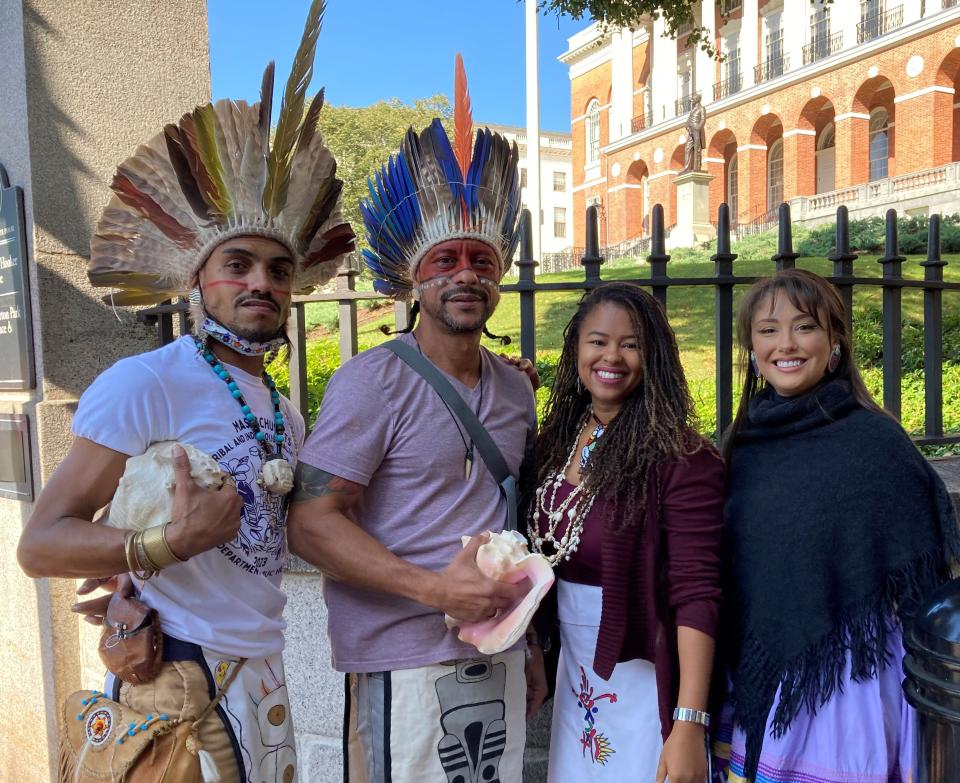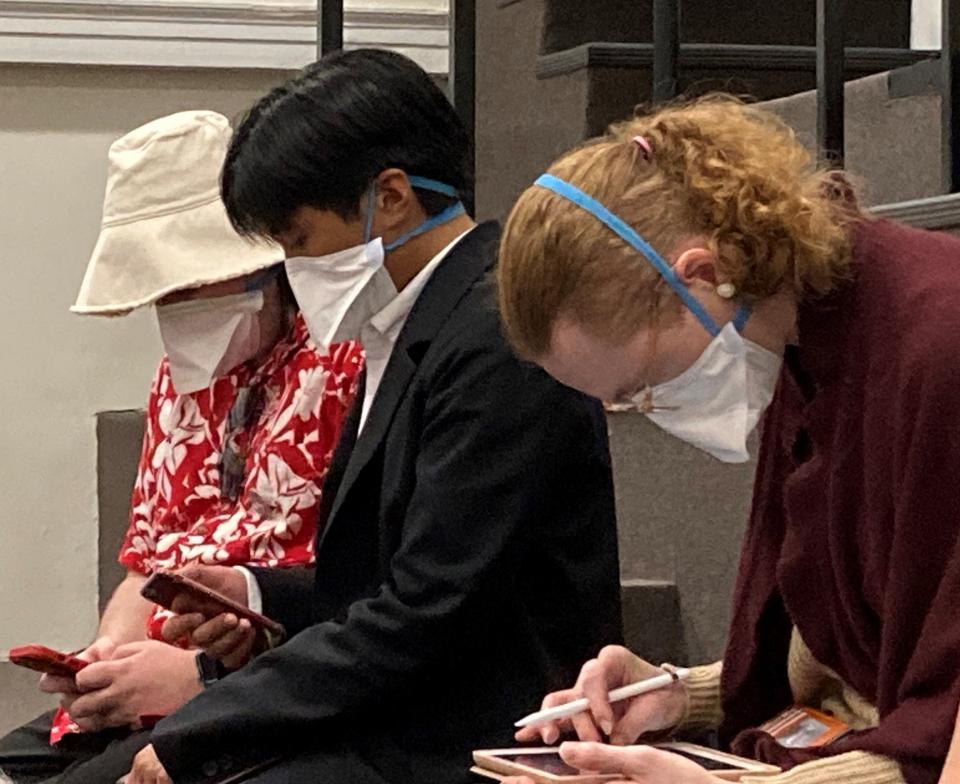From plumbing to telehealth, flurry of bills goes before state committee
- Oops!Something went wrong.Please try again later.
BOSTON - Mental health providers, architects and immigrant advocates were just some of the experts waiting in the wings Tuesday to speak in support of different bills heard by members of the Joint Committee on State Administration and Regulatory Oversight. Measures on the agenda included renaming the second Monday in October to honor the state’s Indigenous people.

The potpourri of bills would address such disparate issues as changing the state’s construction and plumbing codes — the first to ensure structural resilience in light of climate change, the second to eliminate the requirement that builders apply for variances to install gender-neutral toilet facilities in public buildings.
Another proposal would have Massachusetts join a compact of 39 other states that allow mental health providers to offer care to patients in member states without having to apply for a local license to practice. The bill, offered by Rep. Ruth Balser, D-Newton, could help the state address the mental health crisis and lack of sufficient practitioners.
A bill filed by Sen. Sal DiDomenico, D-Everett and supported by more than 60 legislators would require the state’s public facing agencies, from the Department of Children and Families, unemployment and the RMV, to open access to services by translating documents, websites and phone menus into many of the languages spoken in Massachusetts. Currently, agencies that offer translation or interpretation services usually only offer it in one language, typically Spanish.
The target languages included in the bill are Arabic, Cape Verdean Creole, Chinese (simplified and traditional), French, Haitian Creole, Khmer, Korean, Portuguese, Russian, Spanish and Vietnamese. It would also require that agencies consider the demographics of the populations they service and translate everything as a way to guarantee access to services.
Mass. residents speak about 100 different languages
DiDomenico, who has presented the bill in previous legislative sessions, urged the committee to act on the measure as quickly as possible to allow the state to start the transition to other languages.
Proponents of the bill pointed out that about 20% of Massachusetts residents come from elsewhere and 10% speak languages other than English in their homes.
As Gov. Maura Healey announced the start of Hispanic Heritage Month Sept. 15, she also signed an executive order requiring all agencies and state bodies that answer to her administration designate a language access coordinator and create a plan to increase language access for residents.
The bill would extend that requirement to all public-facing state agencies, departments and divisions.
Sen. Liz Miranda, D-Boston, a member of the committee, commented on the importance of the legislation, noting that her family immigrated to the area from the Republic of Cabo Verde, a Portuguese Creole-speaking nation.
“We speak 100 languages in Boston,” Miranda said. However, when her family was seeking services, access was blocked because there was no information offered in Portuguese, one of the most common immigrant languages spoken in Massachusetts. Some 40,000 people in Massachusetts speak Portuguese.
Fabian Torres Ardila, associate director at the Mauricio Gastón Institute for Latino Community Development and Public Policy, told legislators in his testimony that the first year of transition would cost the state roughly $6 million and about $3.5 million the second year. Once the big changes were initiated, the overall cost of language services would level off.
Of the 351 Massachusetts municipalities, non-English speakers live in only 25 cities and towns, Torres Ardila said.
Several speakers detailed horrific circumstances that resulted from the lack of language services, such as the removal of children from custodial parents, missed prenatal appointments and cancellation of MassHealth benefits because documents and phone messages were all in English, with basic services denied because a family spoke only Portuguese.
Dawn Sauma, co-executive director of the Asian Task Force Against Domestic Violence, said workers at the agency spend roughly half their days providing translation and interpretation services for state agencies.
“Language access is a civil right. It’s a human right,” Sauma said.
It is also a core determinant of health outcomes, said Dr. Fiona Danaher, director of the Center for Immigration Health at Massachusetts General Hospital.
If the Legislature passes the bill to join the psychology inter-jurisdictional compact, currently comprising 39 member states including all of New England, mental health providers based in Massachusetts could continue to treat patients who leave the state. That includes members of the military, their families, adolescents graduating from high school and going to college, and those residents who leave for work or unrelated reasons.
Telehealth could offer mental health treatment
“This would allow mental health providers to access an E-passport and offer treatment via telehealth,” said Andrea Barnes, a psychologist who practices in Pembroke. No longer would practitioners have to spend time and money applying for licenses in other states. The change would allow for continuity of care from patients who have established a relationship with trusted therapists.
“A move is a major life change,” Barnes said, explaining that those transitional periods are when patients need their therapists the most. “This is a way to expand access to mental health care.”
Colleague Dr. Aimee Yermish, based in Stow, said she feels as if she abandons her clients when they leave the state.
“They know me, feel safe with me,“ Yermish said, explaining that it can be challenging to establish the same rapport with a new therapist and many may decide not to follow through. “They have to start over.”

Changes to the plumbing code were also on the agenda. Currently the state requires plumbers to apply for variances, each proposed restroom requiring a variance, to install gender-neutral facilities when constructing bathrooms. If the variances are routinely approved, argued Rep. Mindy Domb, D-Amherst, why should the requirement remain in force?
“There’s no reason to require a variance if it is always approved,” Domb said.
Gender-neutral public bathrooms could offer safe havens
Testifying in support were several university students who said their lives became less stressful when gender-neutral facilities were installed in their communities. UMass Amherst has more than 300 gender-neutral bathrooms, many in public buildings, some in the dormitories.
Rep. Jeffrey Turco, D-Winthrop, treated the committee to a short history lesson about the designation of Columbus Day. In his statement opposing the renaming of Columbus Day to honor the state’s Indigenous people, Turco said the origin was based on the lynching of 11 Sicilian immigrants accused of murdering a local sheriff. Despite the trial in which several were found not guilty, the local townspeople released the men from jail and lynched them.
“'The Dagos did it,' was what they were saying,” Turco said. He quoted The New York Times as saying it was the “slithering Guineas” who killed the sheriff.
Rutherford B. Hayes suggested the designation of Columbus Day as a means to celebrate and placate the country’s Italian-American immigrants. The day was formalized and made a national holiday in 1934 by Franklin Delano Roosevelt, Turco said.
“I have no objection to having an Indigenous Peoples Day, but don’t pick one group over another,” Turco said.
The Biden administration declared the second Monday of October Indigenous Peoples Day for the second year in a row in 2022. The commemoration of Native American history and culture is now federally recognized alongside Columbus Day, historically observed on the same day. Twenty states and the District of Columbia celebrate Indigenous Peoples Day or American Indian Heritage Day.
This article originally appeared on Telegram & Gazette: Simple fixes could increase access to state services for residents

